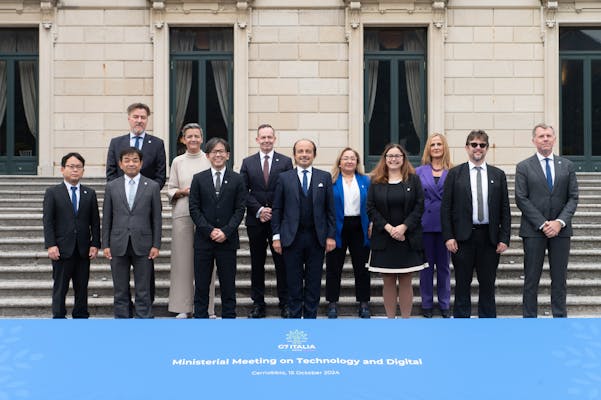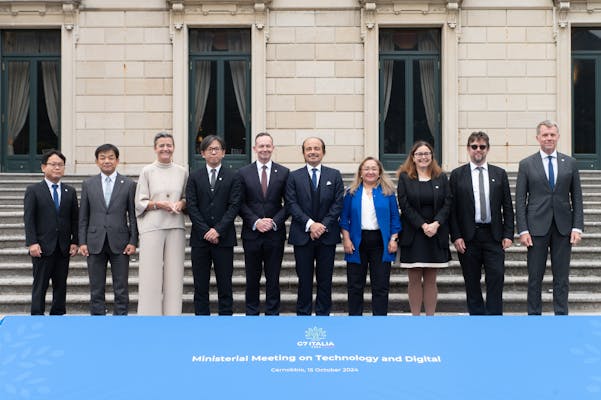The G7 Tech and Digital Ministerial Meeting’s Joint Statement
G7 countries promote a safe and ethical development and use of AI in the public sector in Cernobbio
The G7 Technology and Digital Ministerial Meeting under Italy’s G7 Presidency was held today in Cernobbio. The summit was chaired by the Undersecretary of State for Technological Innovation Alessio Butti and resulted in a Joint Statement (PDF) to recognise the significant achievements attained under this year’s Italian Presidency.
"The G7 Ministerial Meeting on Technology and Digital places Italy at the heart of the global discussion on key topics for the present and future wellbeing of citizens all over the world. The Italian Presidency - Department for Digital Transformation - has coordinated the G7 workstream to advance the ethical development of AI in the public sector, enhance access to public digital services and explore commonalities in the approaches to digital identity. The Italian Presidency’s concrete approach, aligned with the fundamental values of G7 democracies, achieved significant achievements thanks to close cooperation among G7 countries and international organisations, in accordance with the Trento Declaration on 15 March 2024. Today in Cernobbio, we are introducing new tools for the digital transformation of the public sector, as are the Artificial Intelligence Toolkit, the Compendium on Digital Public Services and the Mapping Exercise of Digital Identity Approaches. Lastly, we welcomed the invitation by the Japanese G7 Presidency and the G7 members and contributed to developing and testing a pilot Reporting Framework for the Hiroshima Process International Code of Conduct (HAIP CoC)" explained Undersecretary of State for Technological Innovation Alessio Butti.
Joint Statement and Documents
The Joint Statement adopted by the G7 Tech and Digital Heads of Delegation in Cernobbio is the result of a collaborative process which started at the first Ministerial Meeting in Trento and built on the foundations laid during the Japanese G7 Presidency in 2023.
The Italian Presidency, Department for Digital Transformation, has coordinated the work of the G7 Digital & Technology Working Group (D&T WG) to advance global cooperation in the following areas.
Safe and Trustworthy Development and Use of Artificial Intelligence Systems in the public sector
AI is one of the most intriguing and promising fields of innovation and has the potential to dramatically improve our lives. The development, deployment, and use of all AI systems, however, need to respect the democratic values of G7 countries, protecting human rights and fundamental freedoms. In the framework of the D&T WG, the Italian Presidency developed a Toolkit to enable the ethical development, deployment, and use of AI applications in the public sector. The Toolkit is designed to highlight trends, policy frameworks and multiple AI enablers within G7 members. It aims to share good practices and priority interventions to support the development and use of AI in environments that are secure, safe, and trustworthy with a special focus on AI implementation within the public sector.
Pilot Phase and Reporting Framework for the Hiroshima AI Process – International Code of Conduct
To ensure continuity with the work of the Japanese G7 Presidency in 2023, the Italian Presidency committed to complement the Hiroshima Process International Code of Conduct for Organizations Developing Advanced AI System (HAIP CoC). The Presidency developed a draft Reporting Framework with the support of the OECD and launched a pilot from July 19 to September 6, 2024, involving 20 organizations across ten countries with a true multi-stakeholder perspective. The results will be presented in a Report that will inform the final Reporting Framework to be finalised in the remaining months of the Italian Presidency.
Compendium of Digital Government Services
A robust digital public infrastructure facilitates an easy, user-friendly and secure access to essential public services, enables resilience and fosters social inclusion. The Presidency has developed a Compendium on Digital Government Services, in close cooperation with the OECD, sharing best practices and success stories.
Mapping Exercise of Digital Identity Approaches
Digital identity plays a crucial role in fostering a secure, inclusive, and efficient digital transformation by enabling individuals and businesses to prove their identity and share verified information through digital means. The rising demand for digital services across the public and private sector, along with concerns about digital exclusion, cybersecurity threats, and the misuse of personal data, underscore the need for well-designed digital identity systems supported by appropriate governance frameworks. While traditional identification and authentication means like physical identity cards, passports and passwords remain significant, they alone are insufficient to address the complexities of today's digital landscape. The goal of the Mapping Exercise is to identify commonalities in digital identity approaches among G7 members to inform future work within the G7 and other international fora.
Italian G7 Presidency
On the 1st of January 2024 Italy assumed, for the seventh time, the Presidency of the G7: the group that brings together Italy, Canada, France, Germany, Japan, the United Kingdom, and the United States of America. The G7, in which the European Union also participates, is united by common values and principles and plays an invaluable role in defending freedom and democracy and addressing global challenges. The Italian Presidency will last until 31 December 2024 and will feature a dense programme of technical meetings and institutional events throughout the country. The Summit of G7 Heads of State and Government under the Italian Presidency was held in Borgo Egnazia, in Apulia, on June 13-15, 2024.
The documents presented in Cernobbio are available for download in PDF format on the OECD website.



